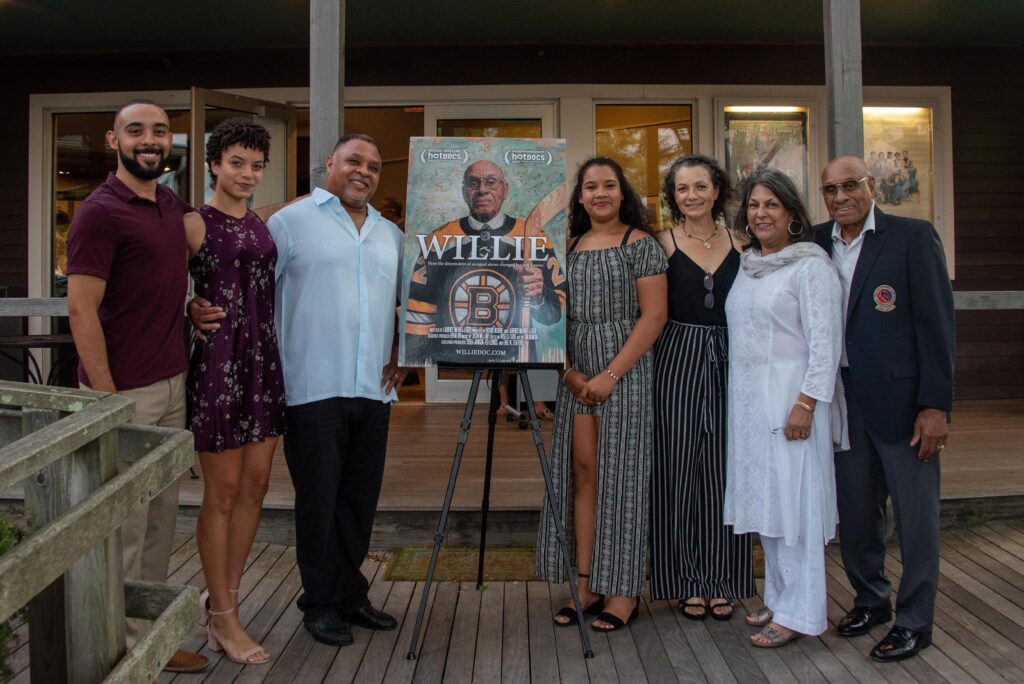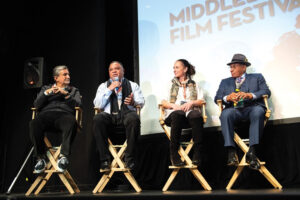Bantam Check In with Bryant McBride ’88 P’20
Bryant McBride ’88 P’20 is CEO of the user generated content company Burst, and producer of the documentary about the first black hockey player in the NHL, Willie O’Ree. The documentary is called "Willie," and debuted in 2019.

Bryant’s company was among many that had to pivot to accommodate the changes due to COVID-19. “We are a small team of about 20 people, and a chunk of that team works in India remotely already. Overnight, we had to make sure we were all remote and effective. In the business we’re in, we work with a lot of local broadcasters. We had to make sure we were functional and safe, and ensuring remote security is a top priority,” McBride said.
The spring continued to change the way McBride and his staff supported their clients. As the country began to see protesters in cities nationwide, the broadcasters Burst worked with faced new challenges. “When there were protests, some local broadcasters were getting shot at with rubber bullets or tear gas.” McBride watched as some newscasters became targets because of their equipment or because of jackets identifying them as from local news stations. In response, Burst helped these journalists transition to mobile recording—using their phones at protests instead of bulky equipment that would be too conspicuous. They then used Burst’s technology to curate the content, and then quickly distribute it to broadcast on-air and onto their digital platforms. McBride said, “We sent out a memo to our clients saying ‘Here are some tips—Our tool can help you capture the compelling content you need, while staying safe and blending into the crowd.’”
It is no surprise that McBride’s daily work blends into standing up for social justice. McBride said that while he is CEO of Burst, his eight-to-midnight career is advocating for social and racial justice. This is evidenced by the effort he put in to not only produce the documentary Willie, but also to create guidance and curriculum tools to help teachers use it in their classrooms. The curriculum he built will be available to 12,000 schools in the next year. The film will also be on the free tier of Peacock, NBC’s streaming competitor to Netflix, which will make it easily accessible for all students. McBride’s efforts couldn’t come at a more critical time. “We are all living a moment of history. This has amplified what has been going on for a very long time. It’s shone a new light,” he says. “People are talking about allyship right now. And I hold dear the companies and individuals that were allies with us for two years [since the start of Willie], when we were creating what we hope is an important film about social justice that will be available to educators.”

When talking about allyship, he points to his fellow alumnus, Sam Kennedy ’95 and the recent response from the Red Sox acknowledging racist behavior that both players and employees of color face at Fenway. Kennedy’s message included a resolve to do better. “That’s a great example of a Trinity graduate leading the way,” he said.
McBride agreed that with a surge of support for movements like Black Lives Matter, the big question is “What now?” “There’s been insidious intent in how we got here…from the 13th Amendment, redlining, to the prison-industrial complex, policing, everyone’s still understanding that—and we are bringing people up to speed on how we got here. It’s important that we all understand that it was not by accident. It was with intent. We have to take the same intent to dismantle it,” he said.
McBride’s own son is a recent graduate from Trinity College. While he can say his son had a great education, he acknowledges that he also had the experience of being a black man at a predominately white institution, and that experience was uneven. “There’s a ton of work to be done,” he says. “We can do better.”
McBride points to the moments of unity felt globally as a result of the coronavirus. “At Burst, we work with local broadcasters. We provide a tool for user generated content, and in seeing some of that content I was blown away by the outpouring of help, support and love that people showed toward each other–you could see the vulnerability and the need for empathy and caring and taking care of each other. There was this crescendo of empathy,” he says. “…and then George Floyd happened.” McBride points out that with no sports, not much entertainment, and most people social distancing, there were no other distractions to divert the gaze of people who saw the video.
“When you have the whole world watching, coming fresh off feeling vulnerable themselves, to see that poor man in that vulnerable state, it was jarring. It seared into the souls of people watching. The optimism I have is planted in that soil. You see how young and diverse the protesters are and you can see how motivated they are, it’s a huge important moment. To sit on the sidelines, to cheer but not be in the game, it’s not acceptable anymore.”
McBride remains optimistic that it is possible to make change. “We can change policing practices, we can change housing practices. We have the capacity. The questions are can we be consistent, can we stay with it, do we have the collective fortitude and the will to succeed?”
“I see a resolve I’ve never seen before,” he says. And to the Trinity community in particular, he offers this thought: “We have been blessed with this amazing education. We have to be the ones to remove this blight from the cracks and crevices. We have to be the ones to eliminate that. Everyone has to do that now.”
Bryant McBride '88 P'20“I see a resolve I’ve never seen before,” he says. And to the Trinity community in particular, he offers this thought: “We have been blessed with this amazing education. We have to be the ones to remove this blight from the cracks and crevices. We have to be the ones to eliminate that. Everyone has to do that now."
